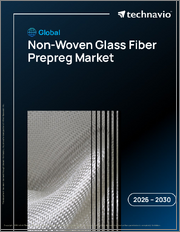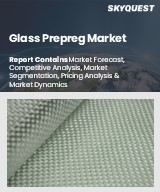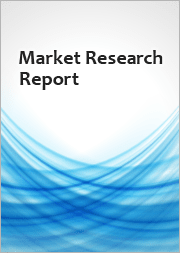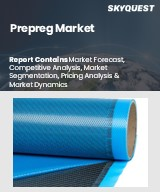
|
시장보고서
상품코드
1642811
탄소섬유 프리프레그 시장 : 시장 규모, 점유율, 동향, 예측 - 제조 공정별, 수지 유형별, 수지별, 최종 이용 산업별, 지역별(2025-2033년)Carbon Fiber Prepreg Market Size, Share, Trends and Forecast by Manufacturing Process, Resin Type, Resin, End Use Industry, and Region, 2025-2033 |
||||||
세계의 탄소섬유 프리프레그 시장 규모는 2024년 113억 달러에 달했습니다. IMARC Group은 향후 시장이 2033년까지 209억 달러에 이를 전망이며, 2025년부터 2033년까지 7.1%의 연평균 복합 성장률(CAGR)을 나타낼 것으로 예측했습니다. 현재 북미가 시장을 독점하고 있으며 2024년에는 35.4% 이상의 큰 시장 점유율을 차지했습니다. 항공우주 산업에서는 연비를 향상시키기 위해 경량 재료에 대한 수요가 높아지고 있으며, 이는 시장을 자극하고 있습니다.
탄소섬유 프리프레그는 촉매 수지를 미리 함침시킨 탄소섬유를 말합니다. 에폭시, 폴리이미드, 페놀, 열가소성 플라스틱 등의 열경화성 수지를 이용하여, 핫멜트나 용제 침지 기술에 의해 제조됩니다. 이 섬유는 빗을 통해 운반되고 수지 함량과 박판으로 하기 위하여 운반지 종이에 깔리고 운반지 종이의 다른 층으로 덮습니다. 높은 조작 강도, 안정성, 내식성, 내피로성, 내화성, 내습성, 내약품성을 발휘합니다. 또한 비용 효율적이고 환경 친화적이기 때문에 항공우주, 방위, 자동차, 풍력에너지, 스포츠 레크리에이션, 의료, 건축 등 다양한 분야에서 폭넓게 이용되고 있습니다.
탄소섬유 프리프레그 시장 동향 :
급속한 산업화와 녹색 에너지원의 채용 증가가 시장 성장을 가속하는 주요 요인 중 하나입니다. 게다가 자동차 산업의 꾸준한 확대는 시장 성장을 뒷받침하고 있습니다. 탄소 프리프레그는 범퍼, 펜더, 스플리터, 휠 아치, 브레이크 덕트, 벤트 등 다양한 자동차 부품 제조에서 금속을 대체하는 경우가 늘고 있습니다. 게다가 다양한 항공우주 기기의 제조에 널리 제품이 채용되고 있는 것도 시장의 성장을 뒷받침하고 있습니다. 최소한의 중량으로 높은 물리적 강도와 구조적 성능과 같은 몇 가지 관련 이점이 있기 때문에 탄소섬유 프리프레그는 캐빈 라이닝, 에어 덕트, 플레넘, 바, 시트, 파티션, 트레일링 에지, 브래킷 제조에 사용됩니다. 또한 테니스 라켓, 자전거, 낚싯대, 골프 샤프트 등 다양한 스포츠 액세서리 제조에도 사용됩니다. 여러 제품 혁신 및 광범위한 연구개발 활동을 비롯한 기타 요인들이 시장을 더욱 견인할 것으로 예상됩니다.
목차
제1장 서문
제2장 조사 범위 및 조사 방법
- 조사의 목적
- 이해관계자
- 데이터 소스
- 1차 정보
- 2차 정보
- 시장 추정
- 상향식 접근
- 하향식 접근
- 조사 방법
제3장 주요 요약
제4장 서문
- 개요
- 주요 업계 동향
제5장 세계의 탄소섬유 프리프레그 시장
- 시장 개요
- 시장 실적
- COVID-19의 영향
- 시장 예측
제6장 시장 내역 : 제조 공정별
- 핫멜트
- 시장 동향
- 시장 예측
- 용제 침지
- 시장 동향
- 시장 예측
제7장 시장 내역 : 수지 유형별
- 열경화성
- 시장 동향
- 시장 예측
- 열가소성
- 시장 동향
- 시장 예측
제8장 시장 내역 : 수지별
- 페놀
- 시장 동향
- 시장 예측
- 에폭시
- 시장 동향
- 시장 예측
- 비스말레이미드
- 시장 동향
- 시장 예측
- 폴리이미드
- 시장 동향
- 시장 예측
- 시아네이트 에스테르
- 시장 동향
- 시장 예측
- 피크
- 시장 동향
- 시장 예측
- 기타
- 시장 동향
- 시장 예측
제9장 시장 내역 : 최종 이용 산업별
- 항공우주 및 방위
- 시장 동향
- 시장 예측
- 자동차
- 시장 동향
- 시장 예측
- 풍력 에너지
- 시장 동향
- 시장 예측
- 스포츠 및 레크리에이션
- 시장 동향
- 시장 예측
- 기타
- 시장 동향
- 시장 예측
제10장 시장 내역 : 지역별
- 북미
- 미국
- 캐나다
- 아시아태평양
- 중국
- 일본
- 인도
- 한국
- 호주
- 인도네시아
- 기타
- 유럽
- 독일
- 프랑스
- 영국
- 이탈리아
- 스페인
- 러시아
- 기타
- 라틴아메리카
- 브라질
- 멕시코
- 기타
- 중동 및 아프리카
- 시장 동향
- 시장 내역 : 국가별
- 시장 예측
제11장 SWOT 분석
- 개요
- 강점
- 약점
- 기회
- 위협
제12장 밸류체인 분석
제13장 Porter's Five Forces 분석
- 개요
- 구매자의 협상력
- 공급기업의 협상력
- 경쟁도
- 신규 참가업체의 위협
- 대체품의 위협
제14장 가격 분석
제15장 경쟁 구도
- 시장 구조
- 주요 기업
- 주요 기업 프로파일
- Axiom Materials Inc.(Kordsa Incorporated)
- Gurit(Tianjin) Composite Material Co. Ltd.
- Hexcel Corporation
- Koninklijke Ten Cate BV(Tennessee Acquisition Holding BV)
- Mitsubishi Chemical Holdings Corporation
- Park Aerospace Corp.
- Plastic Reinforcement Fabrics Ltd.
- SGL Carbon SE
- Solvay(Daikin)
- TCR Composites Inc.(ATK Launch Systems)
- Teijin Limited
- Toray Industries Inc.
The global carbon fiber prepreg market size was valued at USD 11.30 Billion in 2024. Looking forward, IMARC Group estimates the market to reach USD 20.9 Billion by 2033, exhibiting a CAGR of 7.1% during 2025-2033. North America currently dominates the market, holding a significant market share of over 35.4% in 2024. The increasing demand for lightweight materials in the aerospace industry to improve fuel efficiency is stimulating the market.
Carbon fiber prepreg refers to a carbon fiber that has been pre-impregnated with catalyzed resins. It is manufactured using thermoset resins, such as epoxy, polyimide, phenols and thermoplastics, through hot melt and solvent dip techniques. These fibers are led through a comb and laid on a carrier paper for lamination with the resin content, which is further covered with another layer of carrier paper. It exhibits high operational strength, stability and resistance to corrosion, fatigue, fire, moisture and chemicals. It is also highly cost-effective and environment-friendly and finds extensive applications across various such as aerospace, defense, automotive, wind energy, sports and recreation, medical, construction, etc.
Carbon Fiber Prepreg Market Trends:
Rapid industrialization, along with increasing adoption of green energy sources, is one of the key factors driving the growth of the market. Furthermore, the steady expansion of the automotive industry is also providing a boost to the market growth. Carbon prepregs are increasingly replacing metals in the production of various automobile components, such as bumpers, fenders, splitters, wheel archers, brake ducts and vents. Additionally, widespread product adoption for the manufacturing of various aerospace equipment is also favoring the market growth. Owing to the several associated benefits, such as high physical strength and structural performance with minimal weight, carbon prepregs are used in the production of cabin linings, air ducts, plenums, bars, seats, partitions, trailing edges and brackets. They are also utilized for manufacturing various sports accessories, such as tennis rackets, bicycles, fishing rods and golf shafts. Other factors, including multiple product innovations and extensive research and development (R&D) activities, are expected to drive the market further.
Carbon Fiber Prepreg Industry Segmentation:
Breakup by Manufacturing Process:
Hot Melt
Solvent Dip
Breakup by Resin Type:
Thermoset
Thermoplastic
Breakup by Resin:
Phenolic
Epoxy
Bismaleimide
Polyimide
Cynate Ester
PEEK
Others
Breakup by End Use Industry:
Aerospace and Defense
Automotive
Wind Energy
Sports and Recreation
Others
Breakup by Region:
North America
United States
Canada
Asia Pacific
China
Japan
India
South Korea
Australia
Indonesia
Others
Europe
Germany
France
United Kingdom
Italy
Spain
Russia
Others
Latin America
Brazil
Mexico
Others
Middle East and Africa
Competitive Landscape:
The report has also analysed the competitive landscape of the market with some of the key players being Axiom Materials Inc. (Kordsa Incorporated), Gurit (Tianjin) Composite Material Co. Ltd., Hexcel Corporation, Koninklijke Ten Cate B.V. (Tennessee Acquisition Holding B.V.), Mitsubishi Chemical Holdings Corporation, Park Aerospace Corp., Plastic Reinforcement Fabrics Ltd., SGL Carbon SE, Solvay (Daikin), TCR Composites Inc. (ATK Launch Systems), Teijin Limited and Toray Industries Inc.
Key Questions Answered in This Report
- 1. What is carbon fiber prepreg?
- 2. How big is the global carbon fiber prepreg market?
- 3. What is the expected growth rate of the global carbon fiber prepreg market during 2025-2033?
- 4. What are the key factors driving the global carbon fiber prepreg market?
- 5. What is the leading segment of the global carbon fiber prepreg market based on manufacturing process?
- 6. What is the leading segment of the global carbon fiber prepreg market based on resin type?
- 7. What is the leading segment of the global carbon fiber prepreg market based on resin?
- 8. What is the leading segment of the global carbon fiber prepreg market based on end use industry?
- 9. What are the key regions in the global carbon fiber prepreg market?
- 10. Who are the key players/companies in the global carbon fiber prepreg market?
Table of Contents
1 Preface
2 Scope and Methodology
- 2.1 Objectives of the Study
- 2.2 Stakeholders
- 2.3 Data Sources
- 2.3.1 Primary Sources
- 2.3.2 Secondary Sources
- 2.4 Market Estimation
- 2.4.1 Bottom-Up Approach
- 2.4.2 Top-Down Approach
- 2.5 Forecasting Methodology
3 Executive Summary
4 Introduction
- 4.1 Overview
- 4.2 Key Industry Trends
5 Global Carbon Fiber Prepreg Market
- 5.1 Market Overview
- 5.2 Market Performance
- 5.3 Impact of COVID-19
- 5.4 Market Forecast
6 Market Breakup by Manufacturing Process
- 6.1 Hot Melt
- 6.1.1 Market Trends
- 6.1.2 Market Forecast
- 6.2 Solvent Dip
- 6.2.1 Market Trends
- 6.2.2 Market Forecast
7 Market Breakup by Resin Type
- 7.1 Thermoset
- 7.1.1 Market Trends
- 7.1.2 Market Forecast
- 7.2 Thermoplastic
- 7.2.1 Market Trends
- 7.2.2 Market Forecast
8 Market Breakup by Resin
- 8.1 Phenolic
- 8.1.1 Market Trends
- 8.1.2 Market Forecast
- 8.2 Epoxy
- 8.2.1 Market Trends
- 8.2.2 Market Forecast
- 8.3 Bismaleimide
- 8.3.1 Market Trends
- 8.3.2 Market Forecast
- 8.4 Polyimide
- 8.4.1 Market Trends
- 8.4.2 Market Forecast
- 8.5 Cynate Ester
- 8.5.1 Market Trends
- 8.5.2 Market Forecast
- 8.6 PEEK
- 8.6.1 Market Trends
- 8.6.2 Market Forecast
- 8.7 Others
- 8.7.1 Market Trends
- 8.7.2 Market Forecast
9 Market Breakup by End Use Industry
- 9.1 Aerospace and Defense
- 9.1.1 Market Trends
- 9.1.2 Market Forecast
- 9.2 Automotive
- 9.2.1 Market Trends
- 9.2.2 Market Forecast
- 9.3 Wind Energy
- 9.3.1 Market Trends
- 9.3.2 Market Forecast
- 9.4 Sports and Recreation
- 9.4.1 Market Trends
- 9.4.2 Market Forecast
- 9.5 Others
- 9.5.1 Market Trends
- 9.5.2 Market Forecast
10 Market Breakup by Region
- 10.1 North America
- 10.1.1 United States
- 10.1.1.1 Market Trends
- 10.1.1.2 Market Forecast
- 10.1.2 Canada
- 10.1.2.1 Market Trends
- 10.1.2.2 Market Forecast
- 10.1.1 United States
- 10.2 Asia Pacific
- 10.2.1 China
- 10.2.1.1 Market Trends
- 10.2.1.2 Market Forecast
- 10.2.2 Japan
- 10.2.2.1 Market Trends
- 10.2.2.2 Market Forecast
- 10.2.3 India
- 10.2.3.1 Market Trends
- 10.2.3.2 Market Forecast
- 10.2.4 South Korea
- 10.2.4.1 Market Trends
- 10.2.4.2 Market Forecast
- 10.2.5 Australia
- 10.2.5.1 Market Trends
- 10.2.5.2 Market Forecast
- 10.2.6 Indonesia
- 10.2.6.1 Market Trends
- 10.2.6.2 Market Forecast
- 10.2.7 Others
- 10.2.7.1 Market Trends
- 10.2.7.2 Market Forecast
- 10.2.1 China
- 10.3 Europe
- 10.3.1 Germany
- 10.3.1.1 Market Trends
- 10.3.1.2 Market Forecast
- 10.3.2 France
- 10.3.2.1 Market Trends
- 10.3.2.2 Market Forecast
- 10.3.3 United Kingdom
- 10.3.3.1 Market Trends
- 10.3.3.2 Market Forecast
- 10.3.4 Italy
- 10.3.4.1 Market Trends
- 10.3.4.2 Market Forecast
- 10.3.5 Spain
- 10.3.5.1 Market Trends
- 10.3.5.2 Market Forecast
- 10.3.6 Russia
- 10.3.6.1 Market Trends
- 10.3.6.2 Market Forecast
- 10.3.7 Others
- 10.3.7.1 Market Trends
- 10.3.7.2 Market Forecast
- 10.3.1 Germany
- 10.4 Latin America
- 10.4.1 Brazil
- 10.4.1.1 Market Trends
- 10.4.1.2 Market Forecast
- 10.4.2 Mexico
- 10.4.2.1 Market Trends
- 10.4.2.2 Market Forecast
- 10.4.3 Others
- 10.4.3.1 Market Trends
- 10.4.3.2 Market Forecast
- 10.4.1 Brazil
- 10.5 Middle East and Africa
- 10.5.1 Market Trends
- 10.5.2 Market Breakup by Country
- 10.5.3 Market Forecast
11 SWOT Analysis
- 11.1 Overview
- 11.2 Strengths
- 11.3 Weaknesses
- 11.4 Opportunities
- 11.5 Threats
12 Value Chain Analysis
13 Porters Five Forces Analysis
- 13.1 Overview
- 13.2 Bargaining Power of Buyers
- 13.3 Bargaining Power of Suppliers
- 13.4 Degree of Competition
- 13.5 Threat of New Entrants
- 13.6 Threat of Substitutes
14 Price Analysis
15 Competitive Landscape
- 15.1 Market Structure
- 15.2 Key Players
- 15.3 Profiles of Key Players
- 15.3.1 Axiom Materials Inc. (Kordsa Incorporated)
- 15.3.1.1 Company Overview
- 15.3.1.2 Product Portfolio
- 15.3.2 Gurit (Tianjin) Composite Material Co. Ltd.
- 15.3.2.1 Company Overview
- 15.3.2.2 Product Portfolio
- 15.3.3 Hexcel Corporation
- 15.3.3.1 Company Overview
- 15.3.3.2 Product Portfolio
- 15.3.3.3 Financials
- 15.3.3.4 SWOT Analysis
- 15.3.4 Koninklijke Ten Cate B.V. (Tennessee Acquisition Holding B.V)
- 15.3.4.1 Company Overview
- 15.3.4.2 Product Portfolio
- 15.3.4.3 Financials
- 15.3.4.4 SWOT Analysis
- 15.3.5 Mitsubishi Chemical Holdings Corporation
- 15.3.5.1 Company Overview
- 15.3.5.2 Product Portfolio
- 15.3.5.3 Financials
- 15.3.5.4 SWOT Analysis
- 15.3.6 Park Aerospace Corp.
- 15.3.6.1 Company Overview
- 15.3.6.2 Product Portfolio
- 15.3.6.3 Financials
- 15.3.7 Plastic Reinforcement Fabrics Ltd.
- 15.3.7.1 Company Overview
- 15.3.7.2 Product Portfolio
- 15.3.7.3 Financials
- 15.3.8 SGL Carbon SE
- 15.3.8.1 Company Overview
- 15.3.8.2 Product Portfolio
- 15.3.8.3 Financials
- 15.3.8.4 SWOT Analysis
- 15.3.9 Solvay (Daikin)
- 15.3.9.1 Company Overview
- 15.3.9.2 Product Portfolio
- 15.3.10 TCR Composites Inc. (ATK Launch Systems)
- 15.3.10.1 Company Overview
- 15.3.10.2 Product Portfolio
- 15.3.11 Teijin Limited
- 15.3.11.1 Company Overview
- 15.3.11.2 Product Portfolio
- 15.3.11.3 Financials
- 15.3.11.4 SWOT Analysis
- 15.3.12 Toray Industries Inc.
- 15.3.12.1 Company Overview
- 15.3.12.2 Product Portfolio
- 15.3.12.3 Financials
- 15.3.12.4 SWOT Analysis
- 15.3.1 Axiom Materials Inc. (Kordsa Incorporated)






